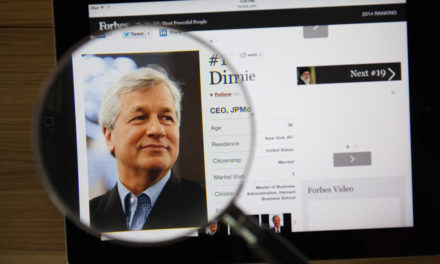“Ná tabhair fiúntas fiú duit” — Irish for “never give a sucker an even break,” according to Google Translate.
YOUGHAL, IRELAND — Last week, uncharacteristically, we began to wonder how we could front-run the Federal Reserve.
When you know what cards the biggest, dumbest, richest, drunkest player will lay on the table … you ought to be able to profit from it.
As we saw on Friday, that’s what some unknown trader(s) is/are doing now — front-running Donald J. Trump and making billions of dollars.
But it’s what Wall Street’s most successful hustlers and speculators have been doing for the last 30 years — front-running the Fed.
The Fed funds their gambles with ultracheap credit. And then, it all but guarantees they won’t lose money. In effect, they used the Fed’s money to bid up prices for their own assets … and have made more than $30 trillion as a result.
Can we play this game too? Maybe …
Update on Life in Ireland
But first, an update …
We have settled into a comfortable routine here in Ireland. We do our usual work during the week. On weekends, we shift to carpentry and stonemasonry. The rhythm agrees with us.
The house is nearly completed. It is warm and convenient, with a south-facing conservatory and an Irish fireplace in the kitchen that takes the chill off a rainy day.
Here is the house when we had just begun the renovation, about a year ago:
 |
And here you see it as it is today:
 |
“This is the first time we’ve ever had such a small house,” we explained to neighbors. “We have six children. And my mother and my aunt both lived with us for many years. So we needed a big place.
“But now, there are just the two of us …” we added with a sigh.
Class Dunce
Ireland is an easy place to live. At least, out here in the country, the pace is calm. People are pleasant. It is green and beautiful, and neither too hot nor too cold to work outside.
Apart from brief sojourns in London, this is the first time we’ve lived outside of the U.S. in an English-speaking country. The accents here can be difficult to understand. Still, it is so easy to get along, we almost feel guilty.
But we’re compensating by learning to speak Irish (Gaeilge) — a language that is used today mainly to torture Irish schoolchildren. It scarcely resembles English, German or any of the Romance languages. Verbs morph into unrecognizable forms; the written words often give no hint as to how they are pronounced.
The “beginners’” class we attend is taught at the public school in one of the areas nearby where people still speak Irish at home — a Gaeltacht. Our young teacher grew up speaking Irish.
Most of our fellow students took many years of Irish in school and are coming back for a refresher. That makes us the class dummies, unable to keep up with the others. Not only did we not know a word of Irish when we began, we can’t understand our teacher even when she is speaking English.
[Bonner-Denning Letter lifetime subscribers can read more on Bill’s efforts to learn the Irish language here.]
Our Next Project
While the house renovation is nearly complete, the guest cottage renovation — which we’re doing by ourselves — has hardly begun. When we bought the place, we didn’t even know it was there, it was so hidden in bushes and vines. It was a total wreck, with only its stone walls left standing. Here’s what it looked like:
 |
We quickly threw on a tin roof, insulated the ceiling, and put up tongue and groove paneling. Then, we dug out the floor (it had a dirt floor) and put down plastic, insulation, and concrete. Now, we are laying down a floor with stone and tile recuperated from other projects.
The trouble is, the stone slabs are too heavy for us to pick up. So we will use the tractor to lift them up to the front door. From there, with the help of one of our sons who is coming for a visit this weekend, we will lower them onto a base of sand.
Stay tuned …
When the Going Gets Tough
Meanwhile, back to front-running the feds …
First, growth is slowing … Bloomberg:
China’s policy makers are preparing for two key meetings in the coming weeks with fresh evidence that sooner rather than later, the number for gross domestic product growth will start with a 5.
Five percent growth is the slowest in China in 25 years. And it is a sign that not only are the Chinese smokestacks cooling off … so are their customers in Europe and America.
Of course, economies expand and contract naturally. Markets famously go up and down. Armies advance … and fall back. The world still turns, in other words.
But for reasons that will leave a future generation of philosophers scratching their heads, today’s geniuses have decided that their job is to stop it. Round and round is all right. Up is okay. Expanding is what they want.
But neither markets nor economies will be allowed to exhale or retreat — not if the authorities can prevent it.
And they believe — against all evidence, logic and reason — that they can stop it with “liquidity.” When the going gets tough, they say, they’ll add more juice.
Heck, they won’t even wait for the going to get tough. Now, they’re adding some “insurance liquidity,” like a glass of sherry in the afternoon to keep their spirits up.
The Wall Street Journal reports:
The Federal Reserve Bank of New York injected $104.15 billion in temporary liquidity into financial markets Thursday.
The intervention came in two parts. One was via a term-repurchase-agreement operation that will last for 15 days that added $30.65 billion. The other was via a one-day repo operation that totaled $73.5 billion.
But it won’t be long before the authorities bring out the hard stuff — even more liquidity. And this noxious brew comes in only one form — new money. It is the money launched in 1971, which has since lost 97% of its value, compared to the pre-1971 model.
Devastating Melee
How to front-run the feds’ cheap new money? Simple: Just hold on to the old money — gold.
In old-money terms, U.S. stocks have lost nearly a third of their value since 1971. The next crisis will probably wipe off another third.
And people hoping to retire on the new money coming from the feds are likely to be seriously disappointed. They may get their money … but it may not buy as much as they had hoped. They would probably be better off with the old money.
As our old friend Richard Russell put it, coming up is the most vicious, dangerous, devastating melee in U.S. financial history.
But when the dust settles, gold will be the last man standing.
Regards,
Bill Bonner
• This article was originally published by Bonner & Partners. You can learn more about Bill and Bill Bonner’s Diary right here.




